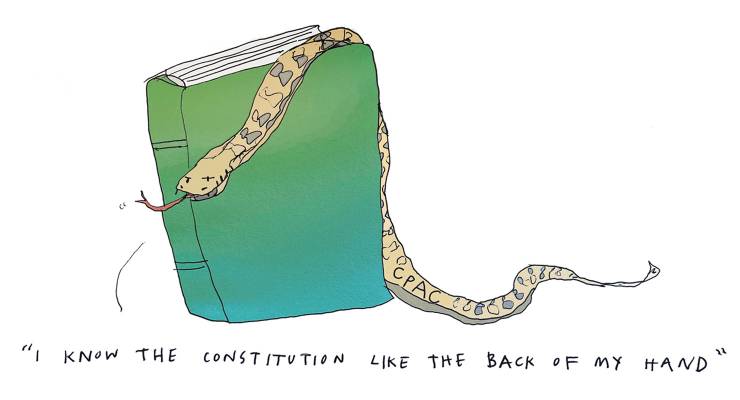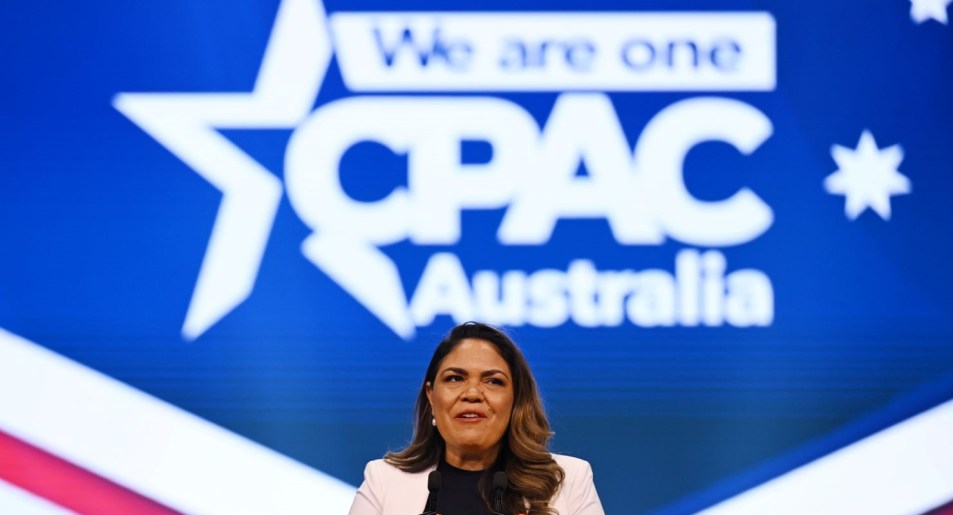
I’m as done with interpretations of the Voice referendum result as everyone else, but equally I don’t think the feeling I have — that something fundamental broke on October 14 — is just the paranoia of the defeated.
On the side of the victors — those brave, principled souls who saved Australia from becoming racist — the signs that battle stations have become permanent are proliferating. The mission of silencing First Nations people properly, not just denying them the Voice but killing off Treaty and truth before they’re even born and, more profoundly, reminding them and everyone else that we are one nation under God, is going to be pursued with deadly seriousness.
In that context, I was intrigued by a missive from the Conservative Political Action Conference (CPAC), one of the prime movers in the gradually coalescing new right of our politics:
All Australians are constitutionally recognised as Australians and we are all equal under the law. To say anything else is misinformation.
That wasn’t in response to anything, more a pre-emptive strike against wrong thinking. While I appreciate that “misinformation” is already being DARVO-ed so as to render it meaningless, and the sheer majesty of CPAC’s dedication to being 100% wrong in every particular of its assertion, it’s a big step down an overtly American path.
The beauty of statements like this is their crafting, to appear at first glance as unexceptional, just a common sense statement of the bleeding obvious tied to a demand that no rational person could deny.
Still, it is entirely incorrect.
First, all Australians are not constitutionally recognised as Australians. Nobody is.
Our constitution, a schedule to an act of the British parliament, came into being in 1901, at which time there were no Australians at all so far as it was concerned. The popular notion that the (white) people who happened to be on this continent at the time of Federation, previously residents of the six colonies, then became citizens of the new nation of Australia, is nonsense.

What actually happened was that those people, as well as First Nations people so far as British law was concerned, stayed exactly what they already were — British subjects. It wasn’t until Australia achieved legitimate independence from the UK, in 1942, that anyone became recognisably by the law an “Australian”.
That change had nothing to do with the constitution either; it was formalised by another act of the British parliament, bless them. The constitution required no change and didn’t get one. The British monarch, who had up until then ruled over all of us in that capacity, took on a new fictional split personality, becoming King of Australia as a supposedly separate identity. Whatever.
The constitution didn’t recognise anyone as Australian, but it did establish a legal platform for that to take place. Among the law-making powers it gave exclusively to the Commonwealth Parliament were two relevant ones: “immigration and emigration”, and “naturalisation and aliens”.
The concept of an Australian “citizen” first arose in 1949, with the implementation of the Nationality and Citizenship Act. It’s been amended and replaced many times, as has the law governing migration. Through these acts, exercising the power given to it by the constitution, Parliament regulates who is a citizen, who is not, and who can come or go.
The High Court has looked at what citizenship means on numerous occasions, confirming generally that it is a word with no definitive meaning; therefore, it is open to parliament to decide, within certain outer boundaries.
One of these boundaries was fixed by the court in 2020, in the cases of Love and Thomas. The question was whether the federal government could deport two men, who were Aboriginal or Torres Strait Islander people but were not citizens (they were born in other countries and held citizenship there, but lived here all their lives without taking Australian citizenship).
The court said no; a First Nations person cannot, by definition, be an “alien”, therefore the government has no power to deal with them as such. The case confirmed that “citizen” and “alien” are not the only possible statuses an Australian can have. Love and Thomas are neither.
What all this means is that the constitution does not recognise what an Australian is, because it says nothing about it and it’s a nebulous term anyway. Parliament, and ministers via their extensive discretionary powers (for example, to revoke a person’s citizenship), control who is recognised as an “Australian”, to the extent that the word means an Australian citizen.
But there are many other Australian non-citizens, such as people with permanent residency visas. They are recognised for all practical purposes as Australian, with only a few exceptions (they can’t vote or be elected to Parliament, for example). The law otherwise affords them equal protection to citizens.
Second question: does the constitution make us all “equal under the law”? Again, no. The constitution says nothing about this principle. As is often remarked, the only “rights” it recognises are freedom of religion and the implied freedom of political communication.
There’s nothing about due process, equal treatment etc. The common law gives us some of this, for example, access to habeas corpus and all the standard protections of criminal law.
Not only does the constitution not help much regarding issues of equality, but it opens the door to positive applications of inequality. Section 51(xxvi) gives the Commonwealth legislative power over “the people of any race for whom it is deemed necessary to make special laws”. It has only ever been used on First Nations people, including to remove from them legal equality in some respects (as with the Northern Territory intervention).
The CPAC assertion is false, and in fact states the opposite of the truth. I didn’t say “Orwell”, but the irony, well… Prepare for a deluge of it.








The Right are capitalizing on Australians’ woeful ignorance of the Constitution. There was an effort made under Keating (with the help of the late historian Stuart Macintyre) to improve the teaching of civics in schools, but it never really took off. If you survey university students on questions like: what is a federal system of government? most can’t tell you. It remains convenient for the Right to keep people in ignorance of our constitution, so that it will mean what they say it means. And heaven forbid (in the Right’s worldview) we get a bill of rights like other democracies, because then people may actually think they have some. Instead, we need to keep quiet and be grateful for the fact that we have a mostly useless monarch in another country.
With you all the way except for the implication that a ‘mostly useless monarch in another country’ is a bad thing. Maybe that’s the best sort of monarch; see Aesop’s fable about the frogs and their King Log.
Rather than settling for a monarch in another country because they’re mostly useless (Whitlam may have disagreed, and nothing has changed to prevent another dismissal) why can’t we have a strictly symbolic head of state that is useful because it is meaningful?
I nominate Uluru. For what is a state without a territory? Man-made global warming is about to show us in the Pacific. A symbol of the land on which we dwell deserves to be at the apex of government to drive home the point that “it’s the ecology, stupid.”
Of course this would require the assent of Anangu People, as well as the willingness of their elders and/or the elders of other First Nations (a rotating roster?) to represent Uluru (or Country more broadly) on the world stage.
CPAC is an American Conservative Union Trojan horse and cannot be treated either neutrally or uniquely native to Australia.
Reason is they are transnational and they do events everywhere attended by e.g. European Christian nationalist authoritarians, and many Anglo visitors are bona fide RWNJs linked to Koch outlets &/or Fox/GB News; see CPAC Hungary https://www.cpachungary.com/en/speakers
Interestingly while Hungary is described in the EU as Putin’s Trojan horse, many ageing Anglo nativist Christian conservative types mistakenly believe they are the driving force in their Trojan horse to nobble the EU & NATO (but don’t see Putin in the horse’s head)?
Useful coverage of the topic.
I suspect many Australians think the provisions of the US Constitution apply to them as well. Think how many TV shows and films you have seen where the arrested party shouts “I know my rights”. It’s why some Australians apparently believe that 911 is the emergency response number.
A good summary, thanks.
They are knowingly playing on the fears, insecurities and lack of knowledge of Australians, as they have only one aim – to be the next ruling party of the country.
Truth plays no part in such shenanigans.
Yes, it is fine to explain the situation in detail, most people won’t read past some sentences, but a lie of a couple of slogans will be remembered and “mis”-quoted as fact ad-infinitum. The phrase, “A lie can travel halfway around the world while the truth is still putting its shoes on” is often attributed to Twain or Churchill. The statement according to the experts is a lie travels a lot faster than the truth. So, the liars know this and continue this procedure as when the truth is fully explained they have moved on to the next lie. The fact checkers and explainers are always on catchup and very few are now listening as the next lie has consumed their space.
Also known as the 20/20 rule. 20 seconds to make a false statement, 20 minutes (or more) to refute it.
Yes Gish Galloping is their forte…
Those right whingers at Cpac are the ultimate Australian elitists. Rather than help people understand the Constitution and properly educate them, they use people’s ignorance of it to spread fear and misinformation in order to control and create some political victories. Unadulterated elitists.
I agree. It feels like something ‘fundamental’ did break on the 14th, thereby setting this nation’s future back a generation. This is a brilliant article, but the bottom line is that the referendum should have only ever proceeded with bi-partisanship support, not division.